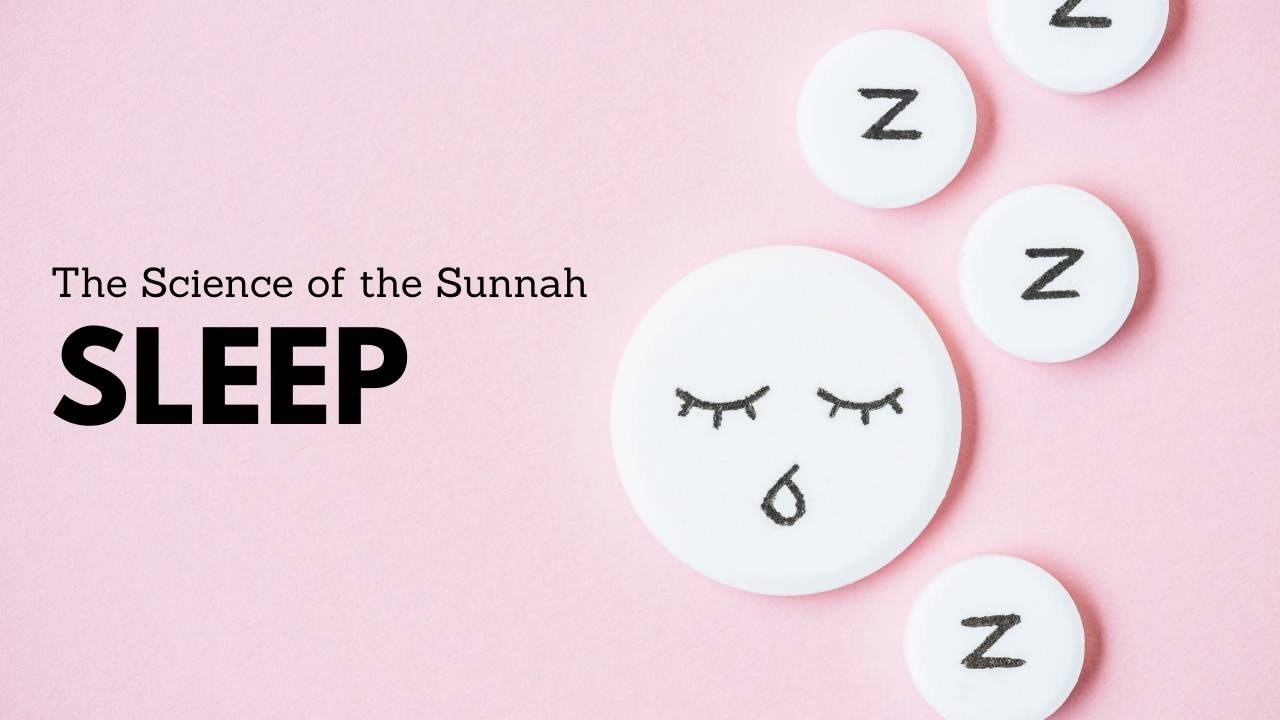Sunnah of Health: Sleep
Nov 04, 2021
ABOUT THIS SERIES: This is part of an ongoing series in which we will explore “The Science of The Sunnah: Health and Longevity. –
Islam is a religion which is “designed” with the Fitra (natural inclination) of the human being in mind. When the human being follows it’s teachings and philosophies they will naturally achieve the best physical, mental and spiritual health possible. Abu Hurairah (RA – May Allah be pleased with him) reported that the Prophet Muhammad (saw – Peace Be Upon Him) said: “There is no disease Allah has created except that he has created its remedy”. (Found in the Bukhari Collection of Hadiths – 7.582) It’s with this in mind that we explore the link between Islamic Practices and Scientific Research that proves its benefit, including sleep, eating, weight loss, and mental health.
The Importance of Sound Sleep
In Islam sleep is considered as one of the signs of the greatness of Allāh. Sleep is mentioned frequently in the Quran. For example, a well-known verse says, “And among his signs is your sleep by night and by day and your seeking of His bounty, verily in that are Signs for those who take heed” [verse 30.23].
In the Qur’an the linguistic terms used identifies the stages of sleeps correspond to the different sleep stages identified by modern sleep science.
- “Sinah”: This word has been defined as “slumber” or “dozing off for a very short period”, during which there is prompt arousal following environmental stimulation. This may correspond to stage 1 sleep identified by modern sleep scientists.
- “Nu’ass”:Nu’ass in verse 8.11 implies a short nap, which may correspond to stage 1 and stage 2 sleep identified by modern sleep scientists.
- “Ruqood”: This word has been given several interpretation as “sleep for a long period”, as has described in the Quran verse 18. 18 and verse 18. 25.
- “Hojoo”: This term describes pious believers who fear Allāh, [verse 51. 17-18]. This word indicates “sleep at night”.
- “Subaat”: The word “Subaat” is derived from the Arabic word “Sabt”, which means disconnecting.Therefore, “Subaat” may be considered to be “deep sleep”, corresponding to the slow wave sleep identified by modern sleep scientists.
Based on the above, Scientist Ahmed S. BaHammam suggest in the Annals of Thoracic Medicine that arrangement of sleep stages/states is Sinah and Nu’ass, followed by Hojoo, and Ruqood and then Subaat.
This emphasis on sleep is not something haphazard. Science shows the soundness of sleep is essential to every aspect of physical and mental health. Lack of sleep effects weight loss, impairs memory, slows the thought process, decrease physical performance, and even contributes to depression and anxiety problems. We will go into the effects of sleep and the lack of sleep in more details in later articles.
This shows that getting a good night’s rest is essential to health. Creating healthy sleep habits in the night time routine is the best way to improve the quality and soundness of your sleep. The habits and suggestions of the Prophet Muhammad (saw) is the best way to guarantee a good night’s rest and is now being proven by research.
THE ETIQUETTE OF SLEEPING IN ISLAM
The etiquette of sleeping in Islam is taken from the example of the Prophet Muhammad (saw) what he said, what he did and what he approved of and disapproved of – (i.e. Sunnah) Among these are several important habit for us to adopt.
In addition to adopting this habits because of them being a sunnah of the Prophet (saw) we can also see preliminary research from several studies are now showing that many of the sleeping etiquettes which was given over 1500 years ago to Muslims have benefits for sound and peaceful sleep.
The Prophet Muhammad’s Sleep Habits
- Use a Mishwak (i.e. – brush your teeth)
- Make Wudu (Ablution)
- Shake out your bed sheets
- Settle your house [turn off lights, cover and put away food]
- Lay on the right side of the body
- Say a Dua’ (Verbal Prayer)
- Do not sleep on your stomach
This habits may seem very simple, so simple infact many overlook them as insignificant. But when we look at what research is now telling us, we should take heed to even the simplest advice of the Prophet.
THE SUNNAH AND SCIENCE OF SLEEP POSITIONS
SCIENCE : In 2012 a study carried out by researchers from Hong Shue Yan University in Hong Kong looked at the habits and sleeping positions of 670 adults and found that those who slept face down had the most vivid dreams: ones involving UFO sightings, love affairs, being locked up, being unable to breathe, or having a sexual relationship with someone famous.
References:
http://www.ncbi.nlm.nih.gov/pmc/articles/PMC3183634/ http://www.ncbi.nlm.nih.gov/pmc/articles/PMC3630974/
LIKE, SAVE, SHARE
Get delicious recipes that will help you break your sugar addiction, balance your hormones and finally lose the weight right in your email.
